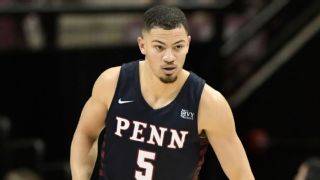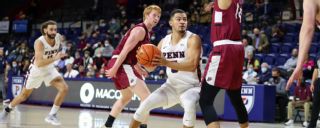|
After suffering three consecutive ACL tears and enduring a canceled season last year, Penn's Jelani Williams, a fifth-year senior, finally played in his first collegiate home game -- an 85-57 win over Lafayette at the Palestra in Philadelphia -- on Tuesday night. He had waited 1,795 days for that opportunity. The 23-year-old Williams suffered a torn ACL for the first time as a senior in high school at Sidwell Friends School in Washington. It would be nearly five years before he had the chance to play in a real basketball game again. As he thought about the challenges he's had to overcome, Williams couldn't contain his emotions. "I'm about to cry," Williams told ESPN on Tuesday night after scoring seven points in his team's win. Williams said he reflected on his journey as he looked into the crowd at the Palestra, one of college basketball's historic venues, on Tuesday night. His family had traveled from Washington to see him play after a series of obstacles had nearly cost him his career. On Dec. 18, 2016, Williams -- who had already committed to Penn -- was a high school senior competing in a holiday tournament when he suffered a torn ACL in his left knee. He enrolled at Penn the following year but didn't play his freshman season of 2017-18 as he rehabbed and prepared to compete as a sophomore. He said he felt comfortable during an international trip to Italy after his freshman year. But during a pick-up game on a summer trip with friends to Martha's Vineyard in July 2018, months before the start of his sophomore season, Williams tore the ACL in his right knee. He would soon start a familiar process to rehab the injury. But he says the challenges were not just physical. "I don't want you to overlook the mental side of coming back from injuries," Williams said. "I think that's critical. I think the reason I kept getting hurt was because I never dealt with the mental aspect of what I was going through. ... When I tore my ACL the second time, I was really in a bad place, mentally. But the way I was wired, I tried to project what I think other people want to see out of me. I wasn't being honest with myself. I think that's literally the biggest part of my story -- it was finally being able to look in the mirror and deal with what I had been dealing with mentally and emotionally for so long." Penn coach Steve Donahue said there were moments when he hoped Williams would decide to end his collegiate career because of the pain he had endured and the hurdles he knew he'd face. "There were times I was hoping he'd walk in and say, 'You know what? I gave it my best. I'm going to move on,' just because I knew how hard it would eventually be," Donahue said. Williams remained determined to play, but admits that as he tried to bounce back from the second ACL tear, he knew he was pushing himself beyond a responsible limit. Williams said he couldn't help himself, that he was suffering emotionally and physically without basketball and felt he had to get back on the court. He was cleared to compete nearly a year after his second ACL tear. In May 2019, it happened again. He'd been working out in hopes of making his debut in the 2019-20 season when he felt a pop in his right knee. He knew. "I went down and I got right up," he said. "I didn't yell. I didn't scream. I didn't do, really, anything. I took my brace off and threw it across the gym and I kind of just sat there." The third ACL tear, and second in his right knee, nearly broke Williams. He dropped out of school for the first semester of the 2019-20 season and went home, where he worked part-time for a nonprofit organization and met with a therapist. He says he learned in therapy that he'd been suffering from depression and anxiety as a result of his injuries. His therapist told Williams he had not approached previous rehabs with a clear mind. Between the therapy, time with his family and what he characterizes as a spiritual regrouping, Williams said he had the right attitude and perspective when he reenrolled at Penn during the second semester of the 2019-20 season and continued to work toward his dream of playing college basketball.  "I gained a lot of gratitude in those couple months," Williams said. "I gained a lot of thankfulness for the support system that I had and all the love that was around me. I felt like I wasn't going through it alone anymore. I felt better than ever when I came back to school in all facets: physically, mentally, emotionally, spiritually. I just felt in a completely different place. And it was beautiful." Last summer, following a more measured rehab -- he didn't play pickup basketball for two months after he was cleared to play in July 2020 -- Williams was ready to go. But the Ivy League was not. The conference canceled the entire 2020-21 because of to concerns about COVID-19. Williams would have to wait until Nov. 10, when Penn played at Florida State -- a full 1,789 days since he'd played his last official basketball game as a senior in high school -- to make his collegiate debut. Six days later, on Tuesday night, he played in his first home game. "All of the stuff he went through and how he handled it was, to me, a lesson in perseverance that all of us should learn from," Donahue said. Williams will graduate from Penn in May and he'll have two years of eligibility remaining. Ivy League policy does not allow graduate students to compete in intercollegiate athletics, so he'll have to find a new home. Not surprisingly, Williams wants to keep playing. He said he often gets the same question from those who hear his story: Why didn't he quit? His response is always the same. "A lot of people ask me that question," Williams said. "I learned a lot. One of the biggest lessons I learned from this is don't pay attention to other people's limits. Those are their limits. For me, I felt like I knew where I messed up in those [first two ACL injuries] and I wanted to do it right. And I wanted to see if I could get a go at it and do it right. And if it worked, it worked, and if it didn't, I would be fine with that. But I knew that I had more in me."
|


